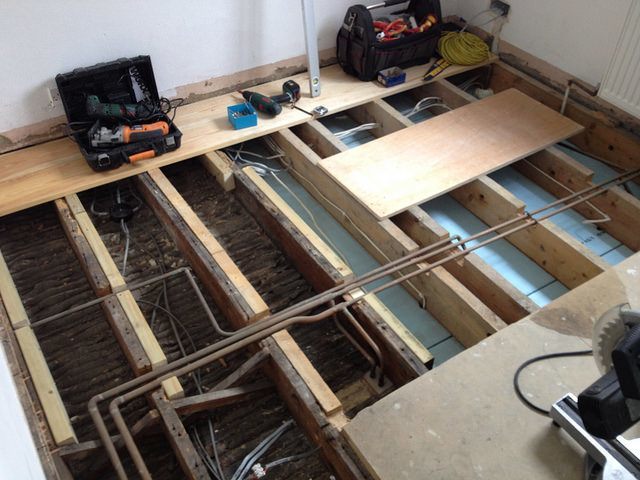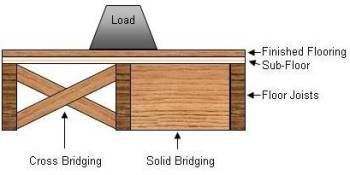Contributing editor mike guertin teams up with structural engineer david grandpré to detail six common and not so common ways to stiffen up the joists and keep the china cabinet from wobbling.
How to firm up a floor with 24 center joists.
If there is no bridging in the center of the span install a row there as well.
For 7 8 inch panels joists can be up to 32 inches on center and for 1 3 32 and 1 1 8 inch thick panels the joists can be.
Metal bridging is available at home centers in lengths to fit between joists that are centered 16 in.
The best choice depends on access to the joists obstructions in the floor system or current remodeling plans.
Revolutionary wood product which allows you to eliminate bounce and vibration in wood frame construction floors.
Joists are the wood beams arranged in a parallel pattern to support the deck s overlying structure.
For 23 32 and 3 4 inch panels joists should be 24 inches on center.
Use a temporary 2x4 post at the midpoint of the span to support the joist until the adhesive cures usually in 24 to 48 hours.
Be sure that each hanger is firmly fastened in place with hanger nails not screws or common nails.
The ends of the joists often sit in metal joist hangers.
Excellent for retrofitting your floors.
Add a layer of plywood.
One technique or a combination may be your most practical solution.
If you need to cut through a joist firm up the floor as shown in fig.
With joists 16 inches on center this floor sheathing has a code plus allowable live load of 240 pounds per square foot.
From the foundation wall.
As mentioned earlier the ledger board and beams support all the floor joists which are usually spaced 16 in.
If your joists span 12 ft for example place bridging 4 ft.
You will place the blocking along the chalk lines.
Repeat this step every 3 to 4 feet across the deck.
The place where you ll be most tempted to create oversize holes and notches under the bathtub is the part of a floor you can least afford to weaken.
Shore up floor joists and reduce the bounce in a number of ways but the six methods outlined here represent a mix of common and not so common solutions.
Bouncy floors are one of the most vexing problems faced in houses both new and old.
Starting near the end of the deck snap a chalk line perpendicular to the joists.
The chalk line should run from one end of the deck to other.
Deflection of the floor sheathing between the joists shouldn t be contributing to the problem since 23 32 inch apa rated sturd i floor can span up to 24 inches according to code.










